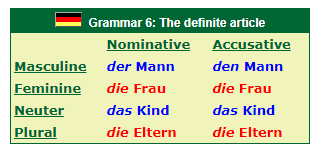Subject and object
Compare the two following English sentences:
1) The dog likes the cat.
2) The cat likes the dog.
The dog is playing a different role in each of the two sentences. In the first sentence, it is carrying out the action of the verb - liking the cat. In this instance, we speak of the dog being the subject of the sentence. We also say that it is in the nominative case.
In the second sentence, the dog is on the receiving end of the action - being liked by the cat. In this instance, we speak of the dog being the object of the sentence. We also say that it is in the accusative case.
Subject and object in German
The majority of sentences which we have examined so far involve nouns in the nominative case, carrying out the action of the verb - e.g. "ich heiße Michael", "Wie alt bist du?". But with the arrival of verbs such as "haben" (= "to have") which take a direct object, we need to acquaint ourselves with the accusative case.
In the English sentences which we have considered above, the nouns "the dog" and "the cat" are written the same regardless of whether the noun is the subject or the object of the sentence. This is not the case in German. The definite article can be written differently depending on whether the noun to which it refers is in the nominative or the accusative case.
Look closely at the definite articles in the German equivalents of the two sentences concerning the dog and the cat:
1) Der Hund mag die Katze.
("The dog likes the cat.")
2) Die Katze mag den Hund.
("The cat likes the dog.")
As the table below indicates however, the definite article only has a different form in the accusative case in this specific instance - namely when we are referring to a singular masculine noun:






